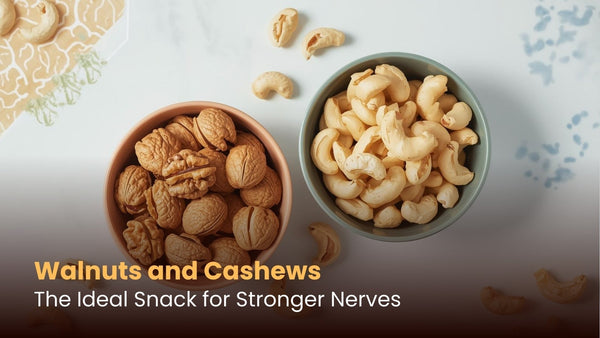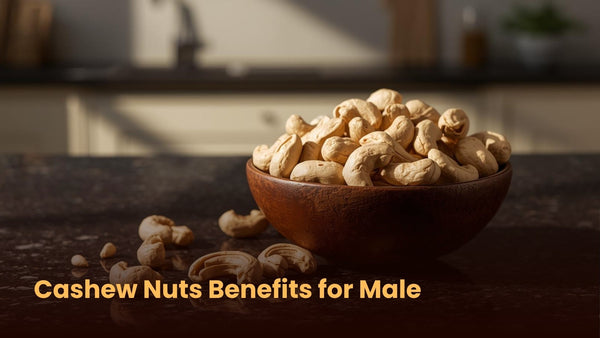Bone health is crucial to overall well-being, yet it is often overlooked until problems arise. Ensuring strong and healthy bones is especially important as we age. Osteoporosis, bone fractures, and weakened bone density can result from nutrient deficiencies and poor lifestyle choices. Fortunately, incorporating certain foods into your diet can support your bones, keeping them strong and healthy. Among these foods are cashews and pine nuts, which are packed with essential vitamins, minerals, and healthy fats that promote bone health.
Cashews are a rich source of magnesium, calcium, and vitamin K, all of which contribute to maintaining strong bones. They are not only delicious but also provide healthy fats that support the absorption of essential vitamins, especially vitamin D, which is critical for bone health.
Pine nuts, on the other hand, contain magnesium, calcium, and phosphorus, key nutrients that help maintain bone density and structure. These nuts are also rich in healthy fats and antioxidants, which protect bone cells and reduce inflammation, further supporting overall bone health.
The Importance of Bone Health
Bones are not just the framework of the body; they play an essential role in protecting internal organs, storing minerals, and producing blood cells. Healthy bones allow for mobility, strength, and balance. As we age, bone mass naturally decreases, and the risk of fractures and conditions like osteoporosis increases. Adequate nutrition, including key vitamins and minerals, is essential to prevent bone loss and maintain bone density. Calcium, magnesium, and vitamin D are commonly known as bone-strengthening nutrients, but other minerals and vitamins also play a significant role. Cashews and pine nuts are rich in some of these essential nutrients, making them ideal additions to a bone-healthy diet.
Key Nutrients for Bone Strength: Cashews and Pine Nuts
Cashews and pine nuts are not only delicious but are also packed with essential nutrients that support bone health. These include:
-
Magnesium: Magnesium helps regulate calcium levels in the bones and aids in bone formation.
-
Calcium: While not as high as dairy products, cashews and pine nuts provide a small but significant amount of calcium, which is necessary for strong bones.
-
Vitamin K: Both nuts contain vitamin K, which is crucial for bone mineralization.
-
Phosphorus: Important for maintaining bone structure and health.
-
Healthy Fats: The unsaturated fats found in these nuts help with the absorption of fat-soluble vitamins like vitamin D, which is essential for bone health.
Nutritional Benefits of Cashews for Bone Health
Cashews are rich in several nutrients that contribute to bone health, particularly magnesium and phosphorus. Magnesium supports bone density by regulating calcium and helping with bone formation. A single serving of cashews contains about 82 milligrams of magnesium, making them an excellent source of this essential nutrient.
Additionally, cashews provide a moderate amount of calcium, which is vital for bone strength and preventing conditions like osteopenia and osteoporosis. Cashews also contain vitamin K, which plays a role in bone mineralization and prevents excessive calcium loss from the bones.
Moreover, the healthy fats found in cashews, especially monounsaturated fats, aid in the absorption of vitamin D. Vitamin D is necessary for calcium absorption, thus further supporting bone health.
Nutritional Benefits of Pine Nuts for Bone Health
Pine nuts are a powerhouse of nutrients that can benefit bone health. They are an excellent source of magnesium, a mineral that is directly involved in the conversion of vitamin D into its active form, enabling better calcium absorption. Pine nuts provide 71 milligrams of magnesium per ounce, contributing significantly to the overall magnesium intake.
They also contain a small but valuable amount of calcium, which helps maintain bone strength and structure. Phosphorus, another key mineral found in pine nuts, is essential for forming and maintaining bones and teeth.
Pine nuts are also high in vitamin E, an antioxidant that helps reduce inflammation and supports the overall health of bone cells. The omega-3 fatty acids found in pine nuts have anti-inflammatory properties, which can further protect bones from inflammation-related bone loss.
How Cashews and Pine Nuts Work Together to Support Bone Density
While both cashews and pine nuts individually offer significant benefits for bone health, when combined, they provide a broader range of nutrients that work synergistically to improve bone density. For example:
-
Magnesium: Both nuts are rich in magnesium, which helps regulate calcium, keeping bones strong and dense.
-
Calcium and Phosphorus: Together, these minerals help build bone structure, with calcium promoting bone strength and phosphorus contributing to the mineralization process.
-
Healthy Fats and Vitamin D: Both nuts contain healthy fats that enhance the absorption of fat-soluble vitamins like vitamin D, which is critical for calcium absorption and bone health.
-
Antioxidants and Anti-inflammatory Properties: Both nuts contain antioxidants (such as vitamin E and other phytonutrients) that help reduce inflammation in bones, protecting against conditions like osteoarthritis and age-related bone degradation.
The combined impact of these nutrients makes cashews and pine nuts an ideal duo for supporting bone health.
Comparing Cashews and Pine Nuts: Which Is Better for Bone Health?
Both cashews and pine nuts are excellent choices for bone health, but they offer slightly different benefits:
-
Cashews are richer in magnesiumand a great source of calcium. They are particularly beneficial for people who need a magnesium boost to support proper calcium absorption and bone formation.
-
Pine nuts offer higher phosphorus content and healthy fats, along with omega-3 fatty acids, making them ideal for reducing inflammation and enhancing overall bone protection.
Ultimately, both nuts contribute to bone health, and consuming a variety of nuts can help ensure you're getting a wide range of nutrients for optimal bone strength.
Tips for Adding Cashews and Pine Nuts to Your Diet
Adding cashews and pine nuts to your diet can be easy and delicious. Here are some ideas:
-
Snack on them raw or roasted: Both cashews and pine nuts can be enjoyed on their own as a quick, healthy snack.
-
Add to salads: Toss them into salads for an extra crunch and nutritional boost.
-
Blend into smoothies: Add a handful of cashews or pine nuts to your smoothie for a creamy texture and a boost of nutrients.
-
Use in cooking:Use pine nuts in pesto or add cashews to stir-fries, curries, or baked goods.
-
Top your cereal or oatmeal: Sprinkle cashews or pine nuts on top of your morning cereal or oatmeal for added flavor and crunch.
Other Lifestyle Strategies for Stronger Bones
While incorporating cashews and pine nuts into your diet is a great way to enhance bone health, there are several other lifestyle changes and habits that can significantly contribute to stronger, healthier bones. These strategies, when combined with a balanced diet, can help maintain bone density, prevent bone-related issues like osteoporosis, and improve overall bone health as you age.
Regular Exercise: Weight-Bearing Exercises
Physical activity plays a vital role in maintaining bone health. Specifically, weight-bearing exercises are extremely beneficial because they stimulate bone growth and increase bone density. These exercises involve any movement that forces the body to fight against gravity, encouraging bones to become stronger and denser.
Examples of weight-bearing exercises include:
-
Walking: A low-impact exercise that involves continuous pressure on bones in the legs and spine, helping maintain bone density.
-
Running: A high-impact activity that places stress on the bones, particularly the legs and spine, which promotes bone strength.
-
Resistance Training: Using free weights, resistance bands, or weight machines helps stimulate bone growth by applying force to bones and muscles, thereby enhancing bone mineral density.
Strengthening exercises, especially those that focus on the upper body, legs, and spine, are essential in promoting bone health. These exercises improve muscle mass and bone strength, reducing the risk of fractures and improving balance. Regular physical activity also enhances joint flexibility, which supports proper posture and minimizes the risk of falls that could result in bone injuries.
Adequate Vitamin D: Sunlight and Vitamin D-Rich Foods
Vitamin D is often called the "sunshine vitamin" because our body synthesizes it when our skin is exposed to sunlight. It plays a crucial role in bone health by helping the body absorb calcium, which is vital for maintaining strong bones. Without sufficient vitamin D, bones can become brittle and more susceptible to fractures.
Inadequate vitamin D levels are linked to bone loss and an increased risk of osteoporosis. Since many people do not get enough sun exposure, especially in colder climates or during the winter months, it’s important to include vitamin D-rich foods in your diet. These foods include:
-
Fatty fish like salmon, mackerel, and sardines
-
Fortified dairy products and plant-based milk
- Egg yolks
-
Mushrooms (exposed to sunlight)
If natural sunlight or dietary intake isn’t enough to meet your vitamin D needs, supplements may be recommended by healthcare providers. Having the right level of vitamin D not only supports bone health but also helps with immune system function and reduces the risk of chronic diseases.
Limit Alcohol and Caffeine
Excessive consumption of alcohol and caffeine can have a negative impact on bone health. These substances can interfere with the absorption of key nutrients essential for bone strength and density, such as calcium and vitamin D. Over time, this can lead to weakened bones and increased susceptibility to fractures.
-
Alcohol: Heavy drinking reduces the body’s ability to absorb calcium, inhibits the production of bone-forming cells, and increases the production of bone-resorbing cells. Chronic alcohol consumption is one of the major risk factors for osteoporosis. It also reduces the body's ability to synthesize vitamin D, which further impacts bone health.
-
Caffeine: High caffeine intake has been linked to a decrease in calcium absorption, especially if calcium intake is already insufficient. Consuming too much coffee or other caffeinated beverages can lead to lower bone density. Caffeine can also reduce the body’s ability to retain calcium, increasing the risk of bone loss over time.
To maintain strong bones, it’s important to limit your intake of alcohol and caffeine. The general recommendation is to consume alcohol in moderation (1-2 drinks per day) and limit caffeine to a moderate level, roughly 300 milligrams per day, which is about the amount in 3 cups of coffee.
Stop Smoking
Smoking is one of the most significant risk factors for poor bone health. Tobacco use has a detrimental effect on bone density and strength, significantly increasing the risk of fractures. Smoking decreases the production of bone-forming cells (osteoblasts) while increasing the number of bone-resorbing cells (osteoclasts). This imbalance leads to a loss of bone mass and can result in weakened, brittle bones.
Cigarette smoke also interferes with the absorption of key nutrients necessary for bone health, including calcium and vitamin D. Additionally, smoking can cause hormonal imbalances that contribute to bone loss, especially in women after menopause.
Quitting smoking is one of the best lifestyle changes for improving bone health and reducing the risk of osteoporosis. Even if you’ve been smoking for years, quitting can still slow bone loss and improve bone density over time.
Adequate Protein Intake
Protein is an essential nutrient that supports the structural integrity of bones, as it is a vital component of bone tissue. In addition to calcium and other minerals, bones require protein to maintain their structure and function. It contributes to the development and maintenance of bone matrix, providing the foundation for minerals like calcium and phosphorus to bind and form strong bones.
Adequate protein intake can improve bone density, particularly in combination with sufficient calcium and vitamin D intake. Studies show that protein helps improve calcium absorption and increases the efficacy of vitamin D, ultimately supporting bone strength.
Sources of high-quality protein include:
-
Lean meats like chicken, turkey, and fish
-
Legumes such as beans, lentils, and peas
-
Dairy products such as yogurt, cheese, and milk
-
Plant-based sources like tofu, quinoa, and nuts (like cashews and pine nuts)
- Eggs and seeds
It's important to balance your protein intake with adequate calcium and other nutrients to support bone health. Too much protein without sufficient calcium can potentially have a negative effect, so moderation is key. For those on plant-based diets, it's crucial to get enough protein from plant-based sources along with other bone-boosting nutrients.
Potential Risks and Considerations
While cashews and pine nuts are nutrient-dense and generally beneficial for bone health, there are a few things to keep in mind:
-
Caloric Content: Both cashews and pine nuts are high in calories, so be mindful of portion sizes, especially if you're managing your weight.
-
Allergies: Some individuals may be allergic to nuts, so it’s essential to avoid them if you have a nut allergy.
- Oxalates in Cashews:Cashews contain oxalates, which can bind with calcium and reduce calcium absorption. If you have a history of kidney stones, it’s best to consume them in moderation.
Conclusion
Incorporating cashews and pine nuts into your diet offers a natural, delicious way to support bone health. Packed with essential nutrients such as magnesium, calcium, vitamin K, and healthy fats, both nuts play a significant role in maintaining bone density and preventing age-related bone loss. When combined with a balanced diet and an active lifestyle, cashews and pine nuts can be valuable allies in the journey toward stronger, healthier bones.
Additionally, if you're looking for high-quality cashews and pine nuts to incorporate into your daily meals, Krishival offers a variety of premium nuts. Krishival's commitment to quality ensures you get the best nutrients in every bite, helping you support your bone health and overall well-being naturally.
Frequently Asked Questions (FAQs)
-
What nutrients in cashews and pine nuts are most important for bone health?
Both cashews and pine nuts provide essential nutrients that play a key role in maintaining strong bones. Magnesium helps regulate calcium levels in the bones, while calcium is crucial for building and maintaining bone density. Vitamin K supports bone mineralization, and phosphorus plays an important role in maintaining bone structure. Together, these nutrients help promote healthy bones.
-
How do magnesium and calcium from cashews support bone strength?
Magnesium in cashews helps regulate calcium levels in bones and supports proper calcium absorption, which is essential for bone formation. Calcium directly contributes to bone strength by fortifying the bone matrix, helping bones remain dense and less prone to fractures.
-
Are pine nuts a good source of minerals for bones?
Yes, pine nuts are a rich source of essential minerals like magnesium, calcium, and phosphorus, which are all crucial for healthy bones. Magnesium helps with calcium absorption, calcium builds and strengthens bones, and phosphorus supports bone mineralization and structure.
-
Can eating cashews and pine nuts help prevent osteoporosis?
Yes, the combination of magnesium, calcium, and phosphorus in cashews and pine nuts can help prevent osteoporosis by promoting bone density. These nuts provide the key nutrients that strengthen bones, improving overall bone health and reducing the risk of bone loss as you age.
-
How do I include cashews and pine nuts in my daily meals?
Cashews and pine nuts can be easily included in your diet. Add them to salads, smoothies, and yogurt for an extra crunch. They’re also great in baked goods, stir-fries, and grain bowls. You can snack on them raw or roasted for a nutritious, bone-healthy treat.
-
Is it better to eat these nuts raw or roasted for bone health?
Both raw and roasted cashews and pine nuts are beneficial for bone health. However, raw nuts tend to retain more of their natural vitamins and enzymes. Roasting may slightly reduce some of the vitamin content, but they still offer significant bone-boosting benefits. Choose whichever suits your taste, but be mindful of portion sizes to avoid excess calorie intake.
-
Are there any side effects of consuming too many cashews or pine nuts?
While cashews and pine nuts are healthy, overconsumption can lead to excessive calorie intake due to their high-fat content. This can contribute to weight gain if not monitored. It's best to consume them in moderation, with a serving size of about 1 ounce per day.
-
Can people with nut allergies benefit from these foods?
No, individuals with nut allergies should avoid cashews, pine nuts, and other tree nuts. Nut allergies can cause serious reactions, so it's crucial to avoid them if you're allergic to nuts. Always consult with a healthcare provider if you’re unsure about including nuts in your diet.
-
How do cashews and pine nuts compare to other bone-strengthening foods?
While dairy products, leafy greens, and fortified foods are also great sources of calcium and magnesium, cashews and pine nuts provide additional bone-boosting nutrients like healthy fats, antioxidants, and phosphorus. The combination of these nutrients makes them unique in supporting overall bone health.
-
What is the recommended serving size for bone health benefits?
The recommended serving size for cashews and pine nuts is approximately 1 ounce per day, or about a small handful. This amount provides a healthy dose of magnesium, calcium, and other nutrients necessary for strong bones. Make sure to balance your intake with other bone-strengthening foods for optimal health.











Share Your Thoughts